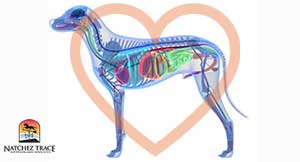What is Western Herbal Medicine for Pets?
In the realm of Western herbal medicine for pets, we put the power of herbs and plant-based remedies front and center.
We believe in combining traditional wisdom with the latest scientific knowledge to take care of your pet’s health, ease any symptoms they might have, and make sure they’re as happy as they can be.
Exploring the world of Western herbal medicine for pets can bring some amazing benefits, but we want to make sure you’re aware of a few things.
Your pet’s well-being is our top priority, so it’s important to consult with us before giving them any herbal remedies.
Why? Because, just like us humans, pets can have reactions or negative effects from certain herbs.
To ensure your pet stays safe on this herbal journey, we’ll create personalized dosages and formulas tailored to their needs.
Not every herb is suitable for every pet, so it’s crucial to seek professional advice to ensure a blend of safety and effectiveness.
 Your pet’s well-being is paramount; consulting with us before administering herbal remedies is crucial.
Your pet’s well-being is paramount; consulting with us before administering herbal remedies is crucial.
Why? Because, just like humans, pets can experience interactions or adverse effects with certain herbs.
To navigate this herbal journey safely, personalized dosages and formulations tailored to your pet’s unique needs are essential.
Not all herbs work well for every animal, so seeking professional guidance ensures a harmonious blend of safety and effectiveness.
How Does Western Herbal Medicine Work?
Western herbs work through various mechanisms to promote pet health and alleviate symptoms.
Here’s an overview of how herbs can help your pet:
- Phytochemicals: Herbs contain bioactive compounds such as alkaloids, flavonoids, terpenes, and other phytochemicals. The compounds interact with the body’s systems, affecting physiological functions. For example, alkaloids in herbs like chamomile or valerian have calming effects on the nervous system, reducing anxiety in pets.
- Anti-inflammatory Properties: Many herbs possess anti-inflammatory properties, which reduce inflammation. This is beneficial for pets suffering from conditions like arthritis or skin allergies. Herbs such as ginger, turmeric, or licorice root contain anti-inflammatory compounds.
- Antioxidants: Certain herbs are rich in antioxidants, which help neutralize free radicals and reduce oxidative stress in the body. Antioxidants play a role in supporting the immune system and overall health. Examples include rosemary, dandelion, and milk thistle.
 Supporting Organ Function: Some herbs have a specific affinity for supporting particular organs. For instance, milk thistle is known for supporting liver function, while dandelion aids in kidney health.
Supporting Organ Function: Some herbs have a specific affinity for supporting particular organs. For instance, milk thistle is known for supporting liver function, while dandelion aids in kidney health.- Adaptogenic Properties: Adaptogens are herbs that help the body adapt to stressors, supporting the body’s resilience and reducing the harmful effects of stress. Herbs like ashwagandha or rhodiola have adaptogenic properties.
- Digestive Support: Many herbs have digestive benefits, helping with digestive issues like nausea, indigestion, or gas. Ginger, peppermint, and fennel often aid digestion in Western herbal choices.
- Topical Applications: Some herbs are used topically to treat skin conditions or promote wound healing. Calendula, aloe vera, and lavender are examples of herbs applied externally for their soothing and healing properties.
What Are The Benefits of Western Herbal Medicine for Pets?
Western herbal medicine offers a natural and holistic approach to supporting the health and well-being of animals.
They provide numerous benefits that range from managing chronic conditions to alleviating stress and promoting specific organ functions.
Western herbal medicine is often our first choice to help with chronic conditions because there are few side effects when compared to pharmaceuticals.
The benefits of Western herbal medicine include:
- Natural Healing: Herbs are natural substances derived from plants and provide a holistic approach to healing. They support the body’s natural healing processes without causing severe side effects, as some pharmaceuticals might.
- Supporting Overall Health: Herbal remedies contribute to a pet’s overall health and wellness by providing essential nutrients, antioxidants, and other bioactive compounds that may be lacking in their diet.
- Managing Chronic Conditions: Some herbs possess properties that help manage chronic conditions such as arthritis, allergies, digestive issues, and skin problems in pets. They alleviate symptoms and improve the quality of life for animals suffering from the ailments.
 Reducing Stress and Anxiety: Certain herbs have calming effects on pets, helping to reduce stress and anxiety naturally. This can be particularly useful in situations like travel anxiety, separation anxiety, or during fireworks or thunderstorms.
Reducing Stress and Anxiety: Certain herbs have calming effects on pets, helping to reduce stress and anxiety naturally. This can be particularly useful in situations like travel anxiety, separation anxiety, or during fireworks or thunderstorms.- Supporting Specific Organ Functions: Herbs like milk thistle for the liver or dandelion for the kidneys can support and promote the healthy functioning of specific organs in pets.
- Fewer Side Effects: When used correctly and under professional guidance, Western herbal medicine has fewer adverse effects than pharmaceuticals.
- Complementary Treatment: Western herbal medicine can sometimes complement conventional veterinary treatments, aiding in recovery or reducing the dosage of conventional medications.
- Topical Applications for Skin Health: Some herbs have soothing and healing properties beneficial to various skin conditions in pets. When applied topically, these herbs can aid wound healing, reduce inflammation, and alleviate itching or irritation.
Does Western Herbal Medicine Have Side Effects or Warnings?
It’s crucial to be aware of potential side effects and warnings when using Western herbal medicine.
While herbal medicine offers numerous benefits, responsible use is vital to ensuring your pet’s safety and well-being.
Side Effects
While Western herbal medicine provides many benefits, it’s essential to be mindful of potential side effects to ensure your pet’s well-being.
Here’s a quick guide to navigate:
 Allergic Reactions: Just like us, pets can have allergies. Keep an eye out for itching, swelling, or difficulty breathing. If you notice any, don’t hesitate to seek immediate veterinary attention.
Allergic Reactions: Just like us, pets can have allergies. Keep an eye out for itching, swelling, or difficulty breathing. If you notice any, don’t hesitate to seek immediate veterinary attention.- Gastrointestinal Upset: Some herbs, like vomiting or diarrhea, may cause mild tummy troubles. No worries, though! This is often temporary and resolves as your pet adjusts to the herbs.
- Interaction with Medications: Mixing herbs with medications? Keeping us in the loop about all your pet’s medications and herbs is crucial. This helps us avoid unwanted interactions affecting your pet’s health.
- Sensitivity: Pets, like us, have their unique sensitivities. If your pet seems a bit delicate, start with small herb doses. Watch how they respond before going full throttle – their well-being is our top priority.
With a sprinkle of caution and a dash of observation, you’ll be on your way to a herbal journey that suits your pet’s needs.
Warnings
Navigate the Western herbal medicine path confidently, ensuring your pet’s safety and well-being.
Here’s your roadmap to responsible herbal care:
- Consultation with Us: Before embarking on an herbal journey, consult with us. We’re here to guide you on suitable herbs, dosages, and potential interactions based on your pet’s unique health and conditions.
- Not All Herbs Are Safe: While herbs bring benefits, not all are universally safe. Some may be toxic to certain animals. Rely on our professional guidance to select herbs tailored to your pet’s safety and needs.
- Pregnant or Nursing Pets: Extra caution is essential when herbs are involved with pregnant or nursing pets. Some herbs may impact reproductive health or have unknown effects on developing fetuses. Always consult with us in such situations.
 Quality of Herbs: Ensure the herbs you choose are of the highest quality and purity. Contaminated or low-quality herbs pose risks to your pet’s health. Opt for herbs with the NASC or GMP seal, ensuring they meet stringent quality standards.
Quality of Herbs: Ensure the herbs you choose are of the highest quality and purity. Contaminated or low-quality herbs pose risks to your pet’s health. Opt for herbs with the NASC or GMP seal, ensuring they meet stringent quality standards.- Monitoring for Changes: Keep a watchful eye on your pet. Regularly observe changes in behavior, appetite, or overall health while using herbal remedies. Report any unusual symptoms immediately – your vigilance is our ally.
- Proper Dosages: Stick to the dosages we recommend. Avoid self-prescribing or assuming one size fits all. Each pet is unique, and their response to herbs can vary. Our guidance ensures a personalized and safe herbal regimen.
By weaving vigilance and professional advice into your herbal journey, you unlock the benefits of Western herbal medicine while safeguarding your pet from potential side effects.
Open communication with us paves the way for a tailored and secure herbal regimen aligning with your pet’s health goals.
Here’s to a flourishing, herbally enriched life for your cherished companion.




